外研版选择性必修第一册Unit 2 Onwards and upwardsDeveloping ideas & Presenting idea 课件(共47张PPT,内嵌视频)
文档属性
| 名称 | 外研版选择性必修第一册Unit 2 Onwards and upwardsDeveloping ideas & Presenting idea 课件(共47张PPT,内嵌视频) | 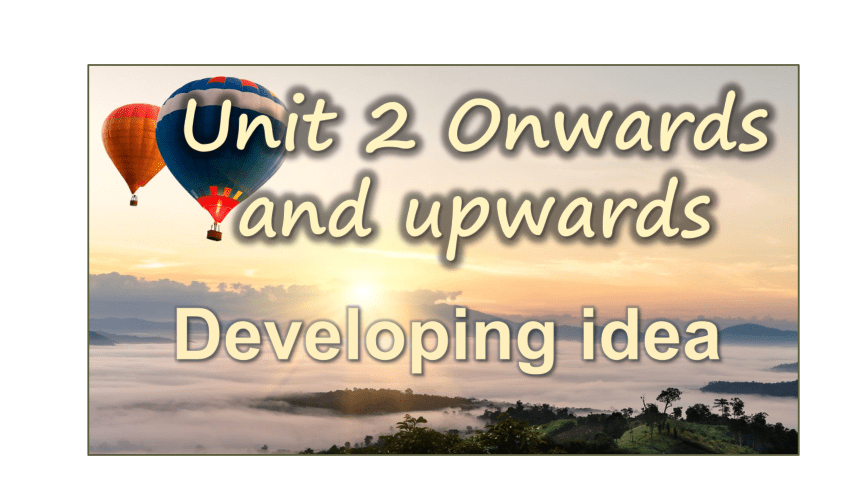 | |
| 格式 | pptx | ||
| 文件大小 | 26.1MB | ||
| 资源类型 | 教案 | ||
| 版本资源 | 外研版(2019) | ||
| 科目 | 英语 | ||
| 更新时间 | 2023-10-26 16:10:23 | ||
图片预览

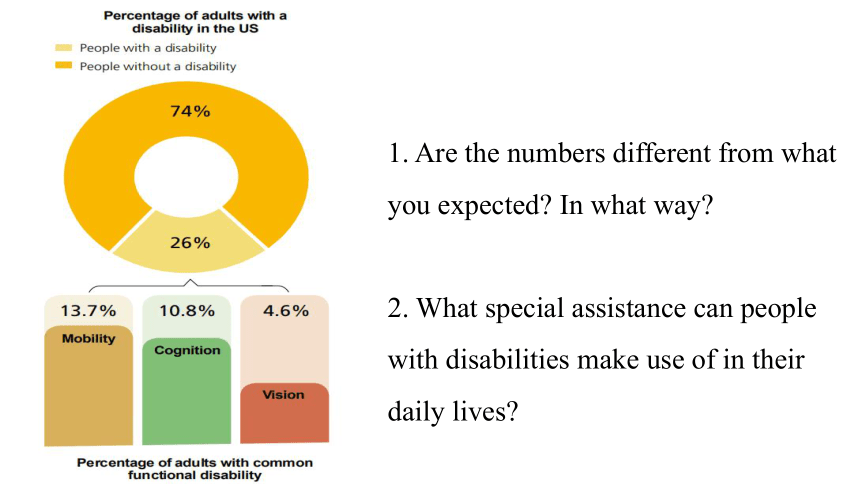
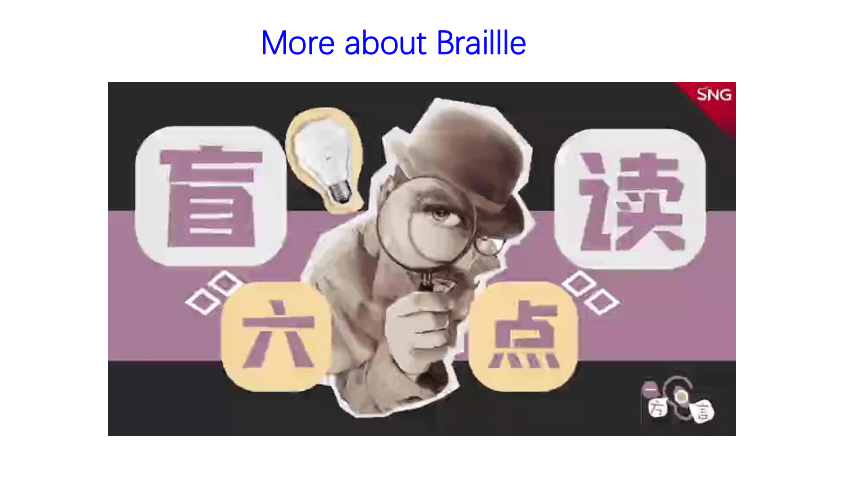
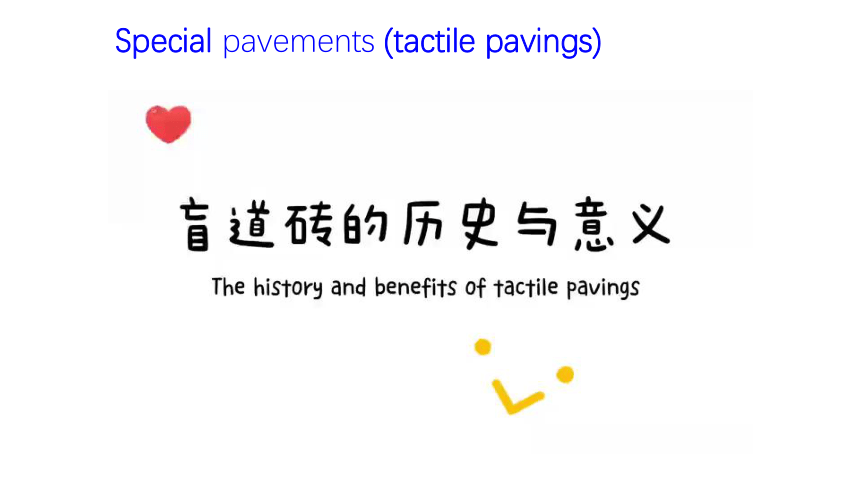
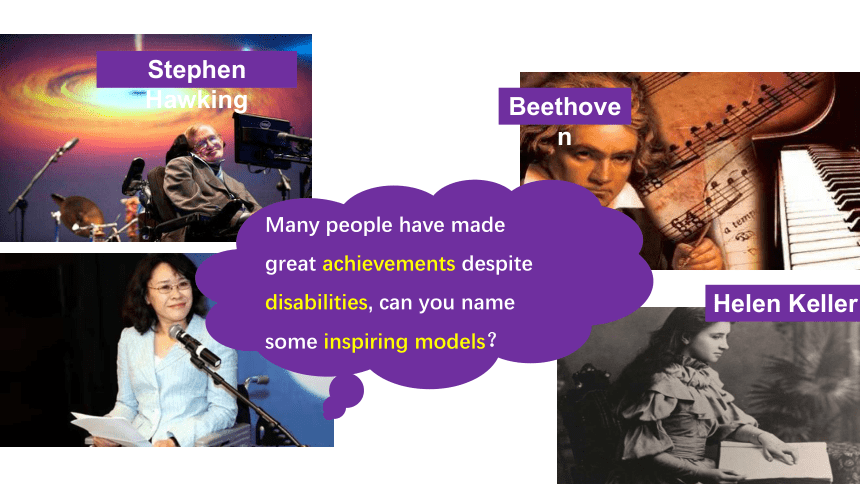
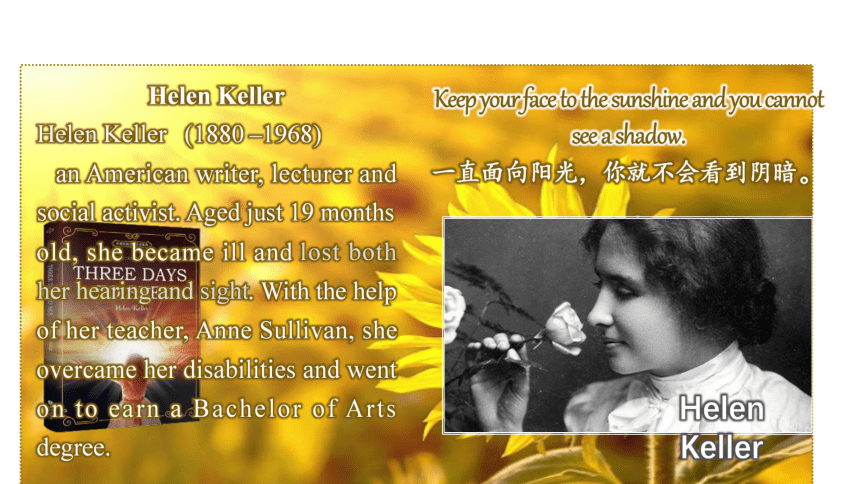
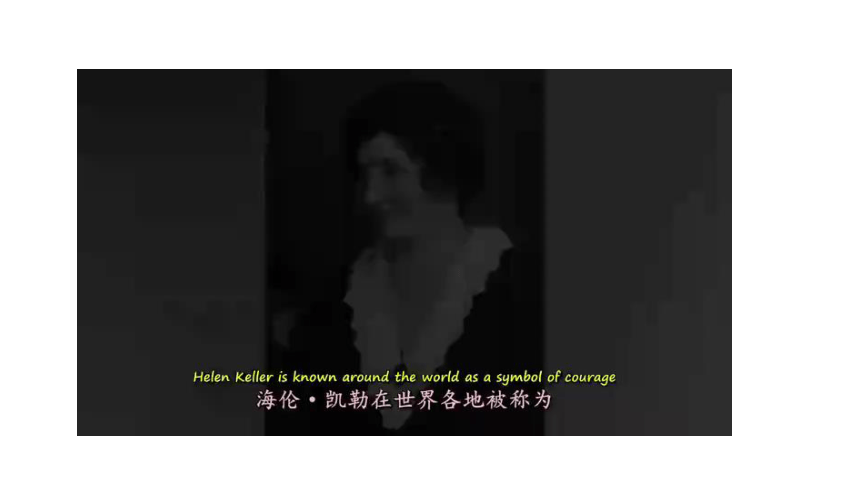
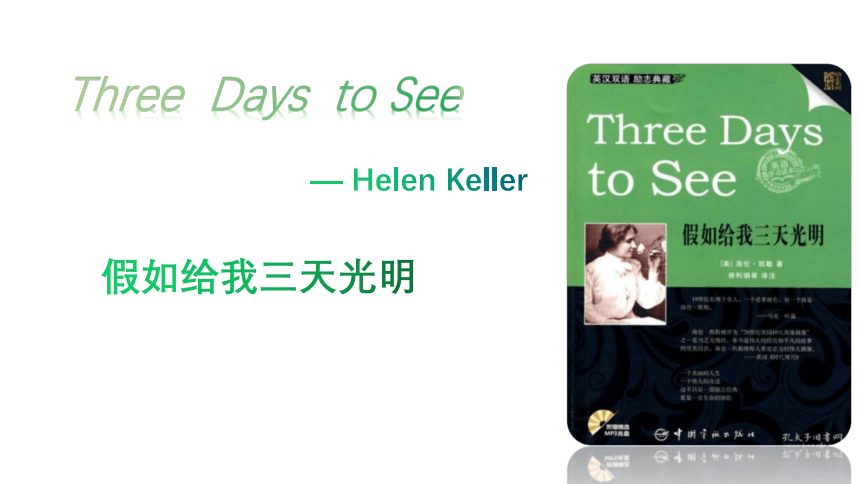
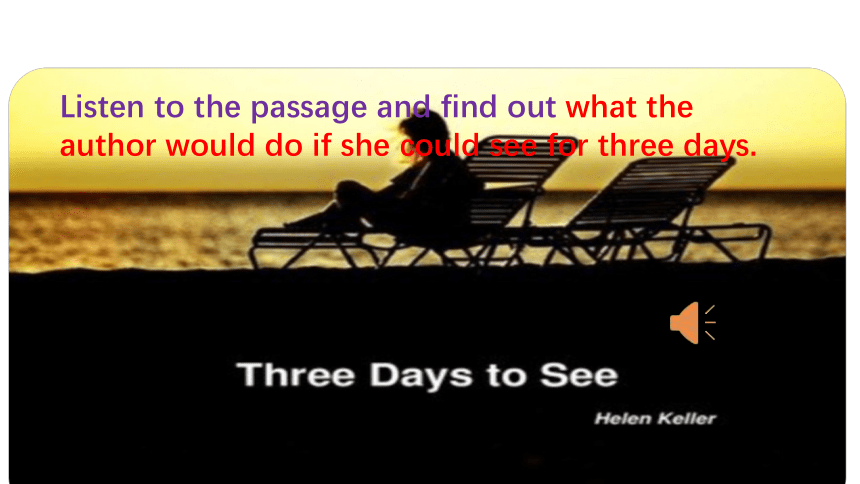
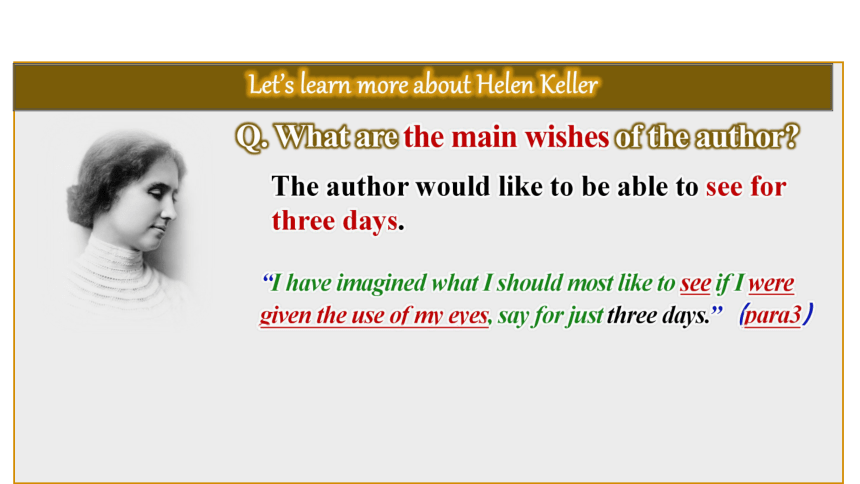
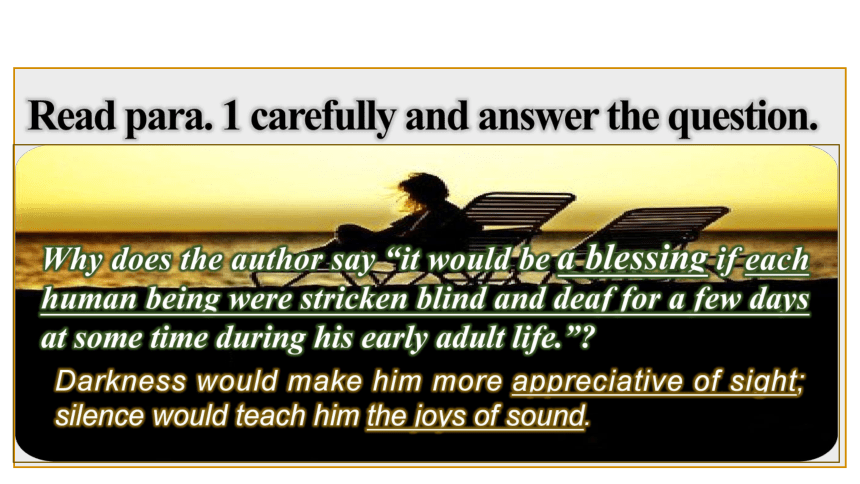
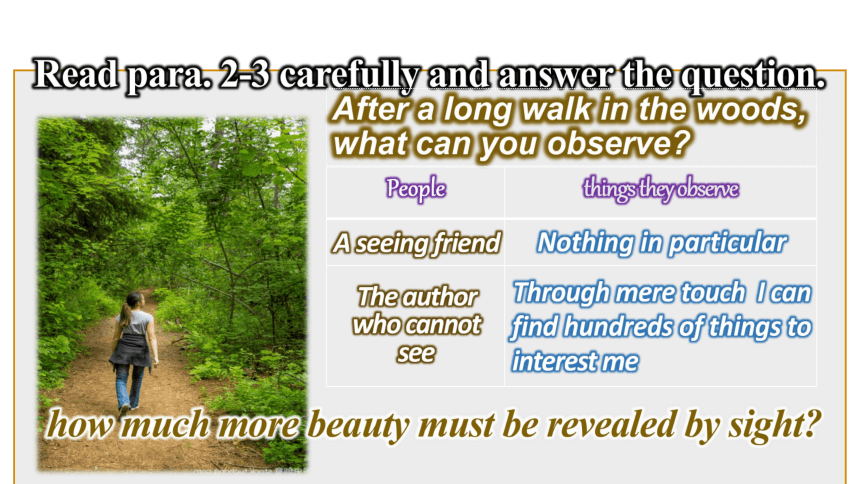
文档简介
(共47张PPT)
Unit 2 Onwards and upwards
Developing idea
1. Are the numbers different from what you expected In what way
2. What special assistance can people with disabilities make use of in their daily lives
More about Braillle
Special pavements (tactile pavings)
Stephen Hawking
Helen Keller
Beethoven
Zhang Haidi
Many people have made great achievements despite disabilities, can you name some inspiring models?
Keep your face to the sunshine and you cannot see a shadow.
一直面向阳光,你就不会看到阴暗。
Helen Keller
Helen Keller
Helen Keller (1880 –1968)
an American writer, lecturer and social activist. Aged just 19 months old, she became ill and lost both her hearing and sight. With the help of her teacher, Anne Sullivan, she overcame her disabilities and went on to earn a Bachelor of Arts degree.
Three Days to See
— Helen Keller
假如给我三天光明
Listen to the passage and find out what the author would do if she could see for three days.
Let’s learn more about Helen Keller
Q. What are the main wishes of the author
The author would like to be able to see for three days.
“I have imagined what I should most like to see if I were given the use of my eyes, say for just three days.”(para3)
Read para. 1 carefully and answer the question.
Why does the author say “it would be a blessing if each human being were stricken blind and deaf for a few days at some time during his early adult life.”
Darkness would make him more appreciative of sight; silence would teach him the joys of sound.
Read para. 2-3 carefully and answer the question.
After a long walk in the woods, what can you observe
People things they observe
A seeing friend
The author who cannot see
Nothing in particular
Through mere touch I can find hundreds of things to interest me
how much more beauty must be revealed by sight
Time What she could do
On the 1st day
On the 2nd day
On the 3rd day
★ to see the kind people who have helped her and accompanied her through
life.
★ to see the books which have opened her mind.
★ take a long walk in the woods and appreciate the beauty of nature.
◆ She would go to the museums.
◆ She would like to see the pageant of man’s progress (a display of the progress
of civilization)
◆ She would spend the evening at a theater or at the movies.
▲ She would spend in the workaday world, amid the haunts of men going about
the business of life (observing people in their day to-day life).
▲ She would again greet the dawn, anxious to discover new delights, new
revelations of beauty.
Read para 7-8 and find out what would happen to the author at midnight.
At midnight
Permanent night would close in on me again. Only when darkness had again descended upon me should I realize how much I had left unseen.
Choose the author’s purpose in writing the passage and give your reasons.
1 To help readers understand what it is like to be blind.
2 To make readers without disabilities appreciate what they have.
3 To persuade readers to care about the blind.
Do you know of any stories about people with disabilities Share one with the class.
Nick Vujicic was born without limbs and doctors have no medical explanation for this birth "defect". As you can imagine, he was faced with many challenges and obstacles. It was very hard for him to get used to, but with the support of his parents, he started to develop attitudes and values which helped him overcome these challenging times. He knew that he was different but on the inside he was just like everyone else.
Facing difficulties and setbacks in life with a positive attitude.
On the first day, she would want to see the kind people who have helped her and accompanied her through life. Then she would like to see the books which have opened her mind. In the afternoon, she would take a long walk in the woods and appreciate the beauty of nature.
On the second day, she would like to see a display of the progress of civilization. She would go to the museums and spend the evening at a theatre or at the movies.
On the third day, she would again greet the dawn, anxious to discover new delights, new revelations of beauty. She will spend the third day observing people in their day-to-day life.
Read the passage and judge whether the following statements are true(T) or false(F).
1.Helen Keller thought that darkness would make a person more appreciative of sight.
2.Helen Keller wasn't eager to see the beauties of the world.
3.Helen Keller wished that she would go to the museums on her second day.
T
F
T
1 To help readers understand what it is like to be blind.
2 To make readers without disabilities appreciate what they have.
3 To persuade readers to care about the blind.
Choose the author’s purpose in writing the passage and give your reasons.
√
SB1U2 Onwards and upwards
Developing ideas - Writing about an experience(page30)
Lead in:
Read the passage and answer the questions.(P30-1)
1. Why did the author go to the “dark restaurant”
2. What difficulties did the author have during the meal
3. How did the author feel after finishing the meal
Lead in:
Read the passage and answer the questions.(P30-1)
1. Why did the author go to the “dark restaurant”
Because the author wanted to understand the experience of being blind, thinking eating would be the most difficult activity.
Lead in:
Read the passage and answer the questions.(P30-1)
2. What difficulties did the author have during the meal
1) The author knocked over glasses and dropped food.
2) The author ate much more slowly, trying to guess
what was being eaten.
3) Pouring water was very difficult.
4) After failing to pick up any food with a fork for five
minutes, the author decided to use hands, but stuck
one hand into a bowl of warm, thick soup.
5) Even using a spoon, most of the soup ended up on
the author’s shirt.
Lead in:
Read the passage and answer the questions.(P30-1)
3. How did the author feel after finishing the meal
The author left the restaurant
feeling hungry, though much
more aware of the challenges
that blind people face.
A dark restaurant in London
While-writing:
Task 1: Try to xperience what it is like to have a disability and make notes.
Now write a short passage to describe your experience.
Setting the scene
Describe the time, place ...
Say what the main character was doing.
Development of the experience
Describe the main actions.
Conclusion
Describe the scene at the end and
the main character’s feelings.
Layout
Discuss the layout of writing about an experience.
Part 1
Part 2
Part 3
Write the experience in three paragraphs.
__________________________________________
__________________________________________________________________________________________________________________________________________________________________________________________________________________
1. Set the scene:
Today / One Saturday afternoon, I / We ...
2. Describe the beginning and development of
the experience:
3. Describe the end and the feeling:
In the end, I / We …
At first, I / We … Then, …
Language Points
I have often thought it would be a blessing if each human being were stricken blind and deaf for a few days at some time during his early adult life.
宾从
be stricken blind and deaf 突然失明/失聪
虚拟语气
如果条件从句中假设的情况不能实现,则是非真实条件句,要用虚拟语气。
Observe and Summary
He wouldn't feel so cold if he stayed indoors. 他要是待在室内就不会觉得这么冷了。 (与现在事实相反)
If we hadn’t made adequate preparations, the conference wouldn't have been so successful.如果我们没有做充分的准备,这次会议是不会开得这么成功的。(与过去事实相反)
-Is Anne coming tomorrow 安妮明天会来吗 -If she were to come,she would call me. 她如果要来的话,就会打电话给我的。(与将来情况相反)
情况 从句谓语动词 主句谓语动词
与现在事实相反 一般过去时(be的过去式用were) would/should/could/ might+V原
与过去事实相反 过去完成时 would/should/could/might+have+过去分词
与将来事实相反 一般过去时(be的过去式用were) should+V原 were to+V原 would/should/could/might+V原
Practice
如果我的钱够的话,我就会为女儿买下这件漂亮的衣服。 If _____________ enough money, I ______________ the beautiful dress for my daughter.
如果你早点起床,你就会赶上火车了。 If you _________________________ earlier, you _____________________________ the train.
如果明天下雨的话,我们就会推迟运动会。 If it ____________________________ tomorrow, we ____________________ the sport meeting.
I had
would buy
与现在事实相反
与过去事实相反
had got up
would have caught the train
与将来事实相反
should rain/ were to rain/ rained
would put off
Darkness would make him more appreciative of sight; silence would teach him the joys of sound.
◆appreciative adj. 感激的,感谢的;欣赏的,赏识的
be appreciative of sth. 感激某事,感谢某事
◆appreciate vt. 感激,感谢;欣赏,赏识;理解,领会
appreciate (sb. /sb.'s) doing sth. 感激(某人)做某事
I would appreciate it if you could do sth. 假如你能做某事,我将不胜感激
the joys of ...的乐趣
Examples
He wrote a warm and appreciative letter, thanking her for everything she had done.他写了一封热情洋溢的,充满感激的信,感谢她所做的一切。
She was appreciative of Greg's concern for her health. 她感谢格雷格对她健康的关心。
I'd appreciate it if you could let me know in advance whether or not you will come. 如果你能提前让我知道你是否要来,我将不胜感激。
I really appreciate working with someone who does such a good job. 我非常乐意与工作如此出色的人共事。
Practice
I'd appreciate ________ so much if you could contact me at your earliest convenience.
I really appreciate you ______________ (offer) to help me, but I am sure that I will be able to make it by myself.
The author holds an ______________ (appreciate) attitude towards what Alice has done for her community.
In this letter, I would like to convey my sincere ______________ (appreciate) to you for your help.
it
offering
appreciative
appreciation
Now and then I have tested my seeing friends to discover what they see. Recently, I asked a friend who had just returned from a long walk in the woods what she had observed. “Nothing in particular,” she replied.
定从
宾从
now and then 时常,有时,不时
in particular 尤其,特别 be particular about
Translation
我时常询问我那些看得见的朋友们,想了解他们看到了什么。最近,我问一个从林子里散步了许久回来的朋友观察到了什么,她答道:“没什么特别的。”
How was it possible, I asked myself, to walk for an hour through the woods and see nothing worthy of note
worth
adj.值得的 n. 价值,意义,作用
be worth sth./doing sth. 值...(钱、价格);值得做某事
worthy
adj.值得...的
be worthy of being done 值得做
be worthy to be done 值得做
be worthy of + n. 应得某事物
worthwhile
adj.值得花时间/金钱/精力的
It’s worthwhile doing/to do sth. 做...是值得的
I who cannot see find hundreds of things to interest me through mere touch. If I can get so much pleasure from touch, how much more beauty must be revealed by sight
定从
mere adj.仅仅,只不过
reveal v.展现,展示
Translation
我一个看不见的人,仅仅通过触觉,就能发现成百上千件引起我兴趣的东西。如果仅仅通过触觉就能得到如此多的快乐,那么视觉能展现多少美好的事物啊。
And I have imagined what I should most like to see if I were given the use of my eyes, say for just three days.
与现在事实相反的虚拟语气
Translation
我想象过,如果我能被恩赐恢复视觉,哪怕只有三天,我最希望看到什么。
宾从
say 假定,比方说
On the first day, I should want to see the people whose kindness and gentleness and companionship have made my life worth living.
定从
make +宾语+宾补
Translation
第一天,我想见几个人,他们用善良、温柔和陪伴让我觉得我有活下去的意义。
I should like to see the books which have been read to me, and which I have revealed to me the deepest channels of human life and the human spirit.
定从
Translation
我还要看书,那些别人读给我的书,那些为我揭示了人生和人类精神的深刻奥秘的书。
On my second day, I should like to see the pageant of man’s progress, and I should go to the museums. I should try to probe into the soul of man through his art. The things I knew through touch I should now see. The evening of my second day I should spend at a theater or at the movies.
probe into 探究
排比句,表达出作者渴望光明和对生活的热爱
后两个 “I should...”分别放句中、句末,从而强调了宾语“the things” “the evening of my second day”使句子结构富有变化,避免单调
Today I shall spend in the workaday world, amid the haunts of men going about the business of life.
go about (以通常的方式)做某事;从事;忙于;开始做
go through
go by
go over
go up
go down
go after
go against
go back (to)
经历;通过;仔细检查;用完
(时间)流逝;消逝
复习;温习
上升
下降
追求;追赶
反对;违背
追溯(到);回到(过去);回顾
Today I shall spend in the workaday world, amid the haunts of men going about the business of life.
Translation
这天我将在平凡的世界里度过,在为生活奔波的人们常去的地方度过。
At midnight permanent night would close in on me again. Only when darkness had again descended upon me should I realize how much I had left unseen.
close in on 包围...;靠近...
宾从
在英语中,“only+状语(从句)”位于句首时,
句子(主句)要用部分倒装结构,即把(主)句中的助动词、情态动词或be动词提到(主句)主语前面。
only强调状语。
副词(now, then, here ...)
only+ 介词短语
状语从句(when, if, after ...)
+助动词/be动词/情态动词
+主语+其他
注意:
如果only修饰的是状语从句,要记住主句倒装,从句不倒装。
only修饰主语时,不用倒装结构。 Only he can answer the question.
Examples
Only in this way can you learn English well. 只有用这种方法你才能学好英语。
Only then did I realize the mistakes I had made.到那时我才意识到我所犯的错误。
Only after I had read the poem a second time did I make sense of it. 我又读了一遍这首诗之后才弄懂了它。
I who am blind can give one hint to those who see: Use your eyes as if tomorrow you would be stricken blind. And the same method can be applied to the other senses.
be applied to (被)应用于
apply to 应用;适应于;申请
apply (to ...) for ... (向...)申请...
apply oneself to (doing) sth. 致力于;在...上努力
applicant n.申请人
applicant n.申请书
Unit 2 Onwards and upwards
Developing idea
1. Are the numbers different from what you expected In what way
2. What special assistance can people with disabilities make use of in their daily lives
More about Braillle
Special pavements (tactile pavings)
Stephen Hawking
Helen Keller
Beethoven
Zhang Haidi
Many people have made great achievements despite disabilities, can you name some inspiring models?
Keep your face to the sunshine and you cannot see a shadow.
一直面向阳光,你就不会看到阴暗。
Helen Keller
Helen Keller
Helen Keller (1880 –1968)
an American writer, lecturer and social activist. Aged just 19 months old, she became ill and lost both her hearing and sight. With the help of her teacher, Anne Sullivan, she overcame her disabilities and went on to earn a Bachelor of Arts degree.
Three Days to See
— Helen Keller
假如给我三天光明
Listen to the passage and find out what the author would do if she could see for three days.
Let’s learn more about Helen Keller
Q. What are the main wishes of the author
The author would like to be able to see for three days.
“I have imagined what I should most like to see if I were given the use of my eyes, say for just three days.”(para3)
Read para. 1 carefully and answer the question.
Why does the author say “it would be a blessing if each human being were stricken blind and deaf for a few days at some time during his early adult life.”
Darkness would make him more appreciative of sight; silence would teach him the joys of sound.
Read para. 2-3 carefully and answer the question.
After a long walk in the woods, what can you observe
People things they observe
A seeing friend
The author who cannot see
Nothing in particular
Through mere touch I can find hundreds of things to interest me
how much more beauty must be revealed by sight
Time What she could do
On the 1st day
On the 2nd day
On the 3rd day
★ to see the kind people who have helped her and accompanied her through
life.
★ to see the books which have opened her mind.
★ take a long walk in the woods and appreciate the beauty of nature.
◆ She would go to the museums.
◆ She would like to see the pageant of man’s progress (a display of the progress
of civilization)
◆ She would spend the evening at a theater or at the movies.
▲ She would spend in the workaday world, amid the haunts of men going about
the business of life (observing people in their day to-day life).
▲ She would again greet the dawn, anxious to discover new delights, new
revelations of beauty.
Read para 7-8 and find out what would happen to the author at midnight.
At midnight
Permanent night would close in on me again. Only when darkness had again descended upon me should I realize how much I had left unseen.
Choose the author’s purpose in writing the passage and give your reasons.
1 To help readers understand what it is like to be blind.
2 To make readers without disabilities appreciate what they have.
3 To persuade readers to care about the blind.
Do you know of any stories about people with disabilities Share one with the class.
Nick Vujicic was born without limbs and doctors have no medical explanation for this birth "defect". As you can imagine, he was faced with many challenges and obstacles. It was very hard for him to get used to, but with the support of his parents, he started to develop attitudes and values which helped him overcome these challenging times. He knew that he was different but on the inside he was just like everyone else.
Facing difficulties and setbacks in life with a positive attitude.
On the first day, she would want to see the kind people who have helped her and accompanied her through life. Then she would like to see the books which have opened her mind. In the afternoon, she would take a long walk in the woods and appreciate the beauty of nature.
On the second day, she would like to see a display of the progress of civilization. She would go to the museums and spend the evening at a theatre or at the movies.
On the third day, she would again greet the dawn, anxious to discover new delights, new revelations of beauty. She will spend the third day observing people in their day-to-day life.
Read the passage and judge whether the following statements are true(T) or false(F).
1.Helen Keller thought that darkness would make a person more appreciative of sight.
2.Helen Keller wasn't eager to see the beauties of the world.
3.Helen Keller wished that she would go to the museums on her second day.
T
F
T
1 To help readers understand what it is like to be blind.
2 To make readers without disabilities appreciate what they have.
3 To persuade readers to care about the blind.
Choose the author’s purpose in writing the passage and give your reasons.
√
SB1U2 Onwards and upwards
Developing ideas - Writing about an experience(page30)
Lead in:
Read the passage and answer the questions.(P30-1)
1. Why did the author go to the “dark restaurant”
2. What difficulties did the author have during the meal
3. How did the author feel after finishing the meal
Lead in:
Read the passage and answer the questions.(P30-1)
1. Why did the author go to the “dark restaurant”
Because the author wanted to understand the experience of being blind, thinking eating would be the most difficult activity.
Lead in:
Read the passage and answer the questions.(P30-1)
2. What difficulties did the author have during the meal
1) The author knocked over glasses and dropped food.
2) The author ate much more slowly, trying to guess
what was being eaten.
3) Pouring water was very difficult.
4) After failing to pick up any food with a fork for five
minutes, the author decided to use hands, but stuck
one hand into a bowl of warm, thick soup.
5) Even using a spoon, most of the soup ended up on
the author’s shirt.
Lead in:
Read the passage and answer the questions.(P30-1)
3. How did the author feel after finishing the meal
The author left the restaurant
feeling hungry, though much
more aware of the challenges
that blind people face.
A dark restaurant in London
While-writing:
Task 1: Try to xperience what it is like to have a disability and make notes.
Now write a short passage to describe your experience.
Setting the scene
Describe the time, place ...
Say what the main character was doing.
Development of the experience
Describe the main actions.
Conclusion
Describe the scene at the end and
the main character’s feelings.
Layout
Discuss the layout of writing about an experience.
Part 1
Part 2
Part 3
Write the experience in three paragraphs.
__________________________________________
__________________________________________________________________________________________________________________________________________________________________________________________________________________
1. Set the scene:
Today / One Saturday afternoon, I / We ...
2. Describe the beginning and development of
the experience:
3. Describe the end and the feeling:
In the end, I / We …
At first, I / We … Then, …
Language Points
I have often thought it would be a blessing if each human being were stricken blind and deaf for a few days at some time during his early adult life.
宾从
be stricken blind and deaf 突然失明/失聪
虚拟语气
如果条件从句中假设的情况不能实现,则是非真实条件句,要用虚拟语气。
Observe and Summary
He wouldn't feel so cold if he stayed indoors. 他要是待在室内就不会觉得这么冷了。 (与现在事实相反)
If we hadn’t made adequate preparations, the conference wouldn't have been so successful.如果我们没有做充分的准备,这次会议是不会开得这么成功的。(与过去事实相反)
-Is Anne coming tomorrow 安妮明天会来吗 -If she were to come,she would call me. 她如果要来的话,就会打电话给我的。(与将来情况相反)
情况 从句谓语动词 主句谓语动词
与现在事实相反 一般过去时(be的过去式用were) would/should/could/ might+V原
与过去事实相反 过去完成时 would/should/could/might+have+过去分词
与将来事实相反 一般过去时(be的过去式用were) should+V原 were to+V原 would/should/could/might+V原
Practice
如果我的钱够的话,我就会为女儿买下这件漂亮的衣服。 If _____________ enough money, I ______________ the beautiful dress for my daughter.
如果你早点起床,你就会赶上火车了。 If you _________________________ earlier, you _____________________________ the train.
如果明天下雨的话,我们就会推迟运动会。 If it ____________________________ tomorrow, we ____________________ the sport meeting.
I had
would buy
与现在事实相反
与过去事实相反
had got up
would have caught the train
与将来事实相反
should rain/ were to rain/ rained
would put off
Darkness would make him more appreciative of sight; silence would teach him the joys of sound.
◆appreciative adj. 感激的,感谢的;欣赏的,赏识的
be appreciative of sth. 感激某事,感谢某事
◆appreciate vt. 感激,感谢;欣赏,赏识;理解,领会
appreciate (sb. /sb.'s) doing sth. 感激(某人)做某事
I would appreciate it if you could do sth. 假如你能做某事,我将不胜感激
the joys of ...的乐趣
Examples
He wrote a warm and appreciative letter, thanking her for everything she had done.他写了一封热情洋溢的,充满感激的信,感谢她所做的一切。
She was appreciative of Greg's concern for her health. 她感谢格雷格对她健康的关心。
I'd appreciate it if you could let me know in advance whether or not you will come. 如果你能提前让我知道你是否要来,我将不胜感激。
I really appreciate working with someone who does such a good job. 我非常乐意与工作如此出色的人共事。
Practice
I'd appreciate ________ so much if you could contact me at your earliest convenience.
I really appreciate you ______________ (offer) to help me, but I am sure that I will be able to make it by myself.
The author holds an ______________ (appreciate) attitude towards what Alice has done for her community.
In this letter, I would like to convey my sincere ______________ (appreciate) to you for your help.
it
offering
appreciative
appreciation
Now and then I have tested my seeing friends to discover what they see. Recently, I asked a friend who had just returned from a long walk in the woods what she had observed. “Nothing in particular,” she replied.
定从
宾从
now and then 时常,有时,不时
in particular 尤其,特别 be particular about
Translation
我时常询问我那些看得见的朋友们,想了解他们看到了什么。最近,我问一个从林子里散步了许久回来的朋友观察到了什么,她答道:“没什么特别的。”
How was it possible, I asked myself, to walk for an hour through the woods and see nothing worthy of note
worth
adj.值得的 n. 价值,意义,作用
be worth sth./doing sth. 值...(钱、价格);值得做某事
worthy
adj.值得...的
be worthy of being done 值得做
be worthy to be done 值得做
be worthy of + n. 应得某事物
worthwhile
adj.值得花时间/金钱/精力的
It’s worthwhile doing/to do sth. 做...是值得的
I who cannot see find hundreds of things to interest me through mere touch. If I can get so much pleasure from touch, how much more beauty must be revealed by sight
定从
mere adj.仅仅,只不过
reveal v.展现,展示
Translation
我一个看不见的人,仅仅通过触觉,就能发现成百上千件引起我兴趣的东西。如果仅仅通过触觉就能得到如此多的快乐,那么视觉能展现多少美好的事物啊。
And I have imagined what I should most like to see if I were given the use of my eyes, say for just three days.
与现在事实相反的虚拟语气
Translation
我想象过,如果我能被恩赐恢复视觉,哪怕只有三天,我最希望看到什么。
宾从
say 假定,比方说
On the first day, I should want to see the people whose kindness and gentleness and companionship have made my life worth living.
定从
make +宾语+宾补
Translation
第一天,我想见几个人,他们用善良、温柔和陪伴让我觉得我有活下去的意义。
I should like to see the books which have been read to me, and which I have revealed to me the deepest channels of human life and the human spirit.
定从
Translation
我还要看书,那些别人读给我的书,那些为我揭示了人生和人类精神的深刻奥秘的书。
On my second day, I should like to see the pageant of man’s progress, and I should go to the museums. I should try to probe into the soul of man through his art. The things I knew through touch I should now see. The evening of my second day I should spend at a theater or at the movies.
probe into 探究
排比句,表达出作者渴望光明和对生活的热爱
后两个 “I should...”分别放句中、句末,从而强调了宾语“the things” “the evening of my second day”使句子结构富有变化,避免单调
Today I shall spend in the workaday world, amid the haunts of men going about the business of life.
go about (以通常的方式)做某事;从事;忙于;开始做
go through
go by
go over
go up
go down
go after
go against
go back (to)
经历;通过;仔细检查;用完
(时间)流逝;消逝
复习;温习
上升
下降
追求;追赶
反对;违背
追溯(到);回到(过去);回顾
Today I shall spend in the workaday world, amid the haunts of men going about the business of life.
Translation
这天我将在平凡的世界里度过,在为生活奔波的人们常去的地方度过。
At midnight permanent night would close in on me again. Only when darkness had again descended upon me should I realize how much I had left unseen.
close in on 包围...;靠近...
宾从
在英语中,“only+状语(从句)”位于句首时,
句子(主句)要用部分倒装结构,即把(主)句中的助动词、情态动词或be动词提到(主句)主语前面。
only强调状语。
副词(now, then, here ...)
only+ 介词短语
状语从句(when, if, after ...)
+助动词/be动词/情态动词
+主语+其他
注意:
如果only修饰的是状语从句,要记住主句倒装,从句不倒装。
only修饰主语时,不用倒装结构。 Only he can answer the question.
Examples
Only in this way can you learn English well. 只有用这种方法你才能学好英语。
Only then did I realize the mistakes I had made.到那时我才意识到我所犯的错误。
Only after I had read the poem a second time did I make sense of it. 我又读了一遍这首诗之后才弄懂了它。
I who am blind can give one hint to those who see: Use your eyes as if tomorrow you would be stricken blind. And the same method can be applied to the other senses.
be applied to (被)应用于
apply to 应用;适应于;申请
apply (to ...) for ... (向...)申请...
apply oneself to (doing) sth. 致力于;在...上努力
applicant n.申请人
applicant n.申请书
